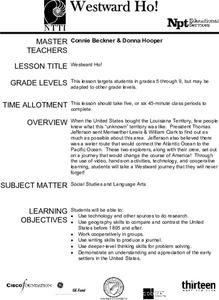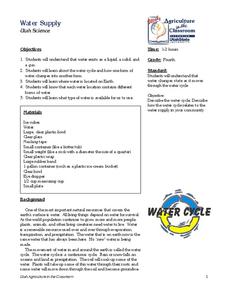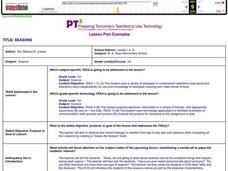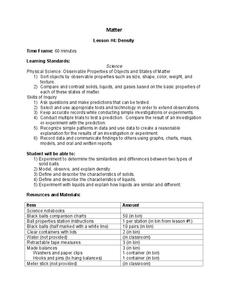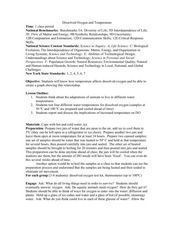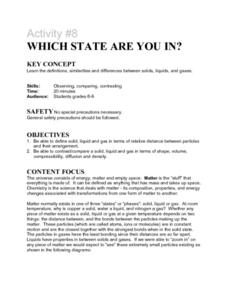Curated OER
Determining the Density of a Liquid
Young scholars find the density of diet soda and regular soda. In this density lesson plan, students measure the mass of a graduated cylinder with 10 different volumes of each soda. They find the mass of the liquid alone and use the...
Curated OER
Westward Ho!
For any teacher of American History, The Lewis and Clark Expedition is a watershed event that should be shared with your students. This is a very good lesson on the Expedition, and the events that led up to it; including The Lousisiana...
Incredible Art
Historical Narrative Using Silhouettes
Connect art and history with a series of activities inspired by the work of contemporary artist, Kara Walker. After watching an Art 21 video about Walker and examining the images in a PowerPoint presentation, class members use...
Curated OER
Water Supply
Fourth graders complete three activities. In this water supply lesson, 4th graders learn that water can exist in different forms and watch a demonstration of each form. Students explore the water cycle and make a water cycle using the...
Virginia Department of Education
A Crystal Lab
Young chemists grow ionic crystals, metallic crystals, and supersaturated crystals in three different lab experiments. Observing these under a microscope allows pupils to compare the various structures.
Curated OER
Professor of Ice
In this environment experiment worksheet, high schoolers complete 3 experiments using ice. First they label each experiment and respond to the four questions given. Then students do the 3 experiments as stated, considering what the...
Curated OER
ZIPPLY Delicious Ice Cream
Second graders explore states of matter when they change a liquid to a solid. Working students make ice cream in a zip-lock bag.
Cornell University
Bacteria Take Over and Down
Bacteria outnumber all other forms of life on Earth. Scholars observe the growth of bacteria in petri dishes to understand their role in maintaining good health. Then, they observe the growth of bacteria after they introduce...
Curated OER
Seasons
First graders observe and record changes in weather from day to day and over seasons, while comparing all four seasons by creating a "Guess the Season" book.
Curated OER
Density
Learners predict when an object will float or sink based on comparison of density of the object to the density of the substance in which it is placed. The access a website and sketch the object in the first column of their table and then...
Curated OER
Cancer: A Crisis of the Cells
Pupils analyze cancer data represented in graphs and charts. They describe the changes in cell structure and function as the result of cancer. They also examine phenomenas that are believed to cause cancer.
Colorado State University
What Is a "Model"?
Model the transfer of energy during a typical 24-hour period. Young scholars use a game-like approach to learning the patterns of heat transfer through the day and night. Groups of four exchange different tokens as the energy transfers...
Curated OER
The Water We Drink
Third graders relate that the quality of their drinking water is subject to the condition of the environment and water found in streams and creeks in their community. They track the travel of a wad of paper from a student's desk to a...
Virginia Department of Education
Equilibrium and Le Chatelier’s Principle
The best part of learning about equilibrium is that nothing changes. Young chemists observe four demonstrations during this instructional activity: equilibrium in a saturated solution, equilibrium with an acid-base indicator, equilibrium...
Close Up Foundation
Teach the Vote
Why is voting important? A social studies unit presents a non-partisan approach to the importance of voting, to voting laws and procedures, and to resources that voters need to become informed voters.
Humanities Texas
Primary Source Worksheet: Excerpt from Reagan's Farewell Address
Here's a worksheet designed to help learners develop their skill reading primary source documents. The questions, based on an excerpt from Ronald Reagan's Farewell Address, encourages close reading and analysis.
Core Knowledge Foundation
Genetics and the Master Race
How did the beginnings of genetic research influence the Nazi party? A thorough, engaging unit incorporates the work of Gregor Mendel, the study of inherited traits, and the use of racism and discrimination during the Holocaust.
Curated OER
What's the Matter? (Experiments)
Students observe a scientific discrepant event, and are then challenged to create experiments to solve the dilemma.
Curated OER
Dissolved Oxygen and Temperature
Young scholars are shown how temperature affects dissolved oxygen and they create a graph showing this relationship. They think about the adaptations of animals to live in different water temperatures. Students test four different water...
Curated OER
The Chemistry of Ice Cream
In this chemistry of ice cream learning exercise, learners investigate colligative properties and how they affect freezing points while making ice cream. Students answer short answer questions to determine if freezing is an endothermic...
Curated OER
Making Ice Cream
Student examine the physical changes of matter and are able to describe them. They make ice cream in plastic bags to observe the changes in matter. They describe and record the changes in the ice cream mixture as it freezes.
Curated OER
Water and Ice
Students conduct an experiment. In this forms of water instructional activity, students observe ice to see what changes take place and then write in their journal about what they observed.
Curated OER
Characteristics of Materials
Students describe and compare common properties of various classroom materials. In this science/matter lesson, students observe common classroom items and the materials they are made of to complete a list of common properties.
Curated OER
Activity #8 Which State Are You In?
Middle schoolers define, give similarites and differences between solids, liquids, and gases. They compare and contrast a solid, liquid and gas in terms of shape, volume, compressibility, diffusion and density. Pupils classigy common...



